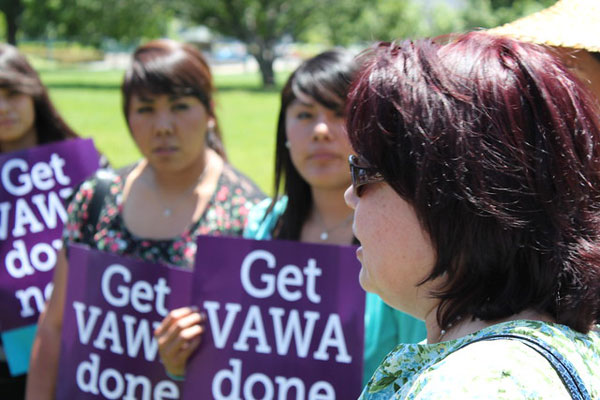
April 5, 2019; The Root’s “The Glow Up” and Time (Associated Press)
In spite of staunch opposition from the National Rifle Association (NRA), on Thursday, April 4th, the US House of Representatives reauthorized the Violence Against Women Act (VAWA) with some provisions that restrict gun ownership and expand protections for transgender victims. The Violence Against Women Act has been in effect for 25 years. The vote in favor of the House measure was 263–158. All Democrats but one voted yes. Most Republicans voted no, but 33 voted in favor of the bill.
As the Democratic women of the House lined up for a photo-op, dressed in purple—the color of domestic violence campaigns—when VAWA passed in the House, the ire of the NRA was palpable. This vote, they threatened, would be a key issue when the NRA rated legislators on their loyalty and have an impact on what kind of funding they’d receive. Why? This iteration of VAWA closes the “boyfriend loophole.”
As Matthew Daly of the Associated Press explains, “Under current federal law, those convicted of domestic abuse can lose their guns if they are currently or formerly married to their victim, live with the victim, have a child together or are a victim’s parent or guardian. The proposed amendment would extend the provision to stalkers and current or former dating partners.”
Sign up for our free newsletters
Subscribe to NPQ's newsletters to have our top stories delivered directly to your inbox.
By signing up, you agree to our privacy policy and terms of use, and to receive messages from NPQ and our partners.
Robin Lloyd, managing director of a gun-control group founded by former Rep. Gabby Giffords, notes that up to half of all domestic violence victims are abused by a dating partner, rather than a spouse or live-in boyfriend. Lloyd, Daly writes, called the gun-control amendment “truly a life-saving provision,” adding that gaps in federal law allowing abusers and stalkers to obtain guns are “a key driver of the staggering levels of lethal violence against women in the US.” According to Lloyd, an estimated 4.5 million women have been threatened with a gun by an intimate partner, and nearly one million women alive today have been shot, or shot at, by an intimate partner.
In addition to restrictions on gun ownership, this reauthorization of VAWA also includes provisions expanding protections for transgender women, allowing for gender identity rather than biological assignment in prisons and shelters. Once again, this issue raises this ire of conservatives who see this as a threat to the safety of women rather than a means of protecting them. But the authors of the legislation see the rates of abuse and death of transgender women who are placed in prison with male prisoners as a travesty of justice and an act of violence against women.
The bill now progresses to the Senate, where discussions are already underway in the Senate for a bill that makes more modest changes in the VAWA legislation. Senators Diane Feinstein (D-CA) and Joni Ernst (R-IA) have been working on their own version, but have yet to file a bill.
One of the contentious issues in the Senate is just getting a bill brought forward for a vote. Many a bill now languishes in the Senate. But there is an election coming up in 2020. Voting against the Violence Against Women Act (or holding it hostage and not voting at all) may be an electoral liability. Women will be watching.—Carole Levine













